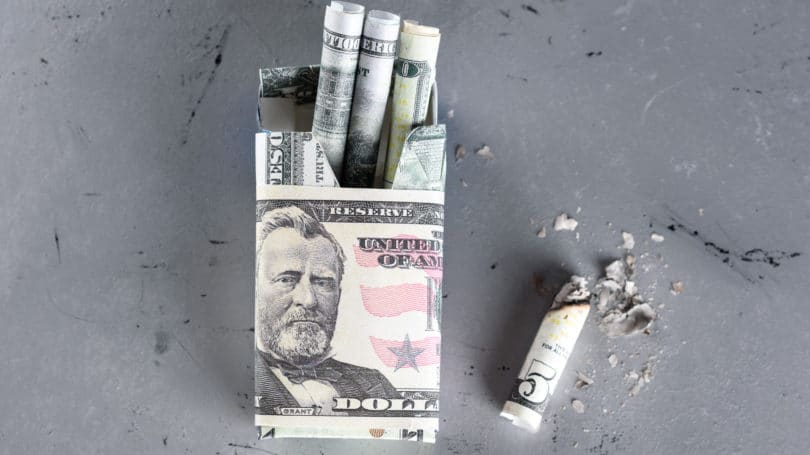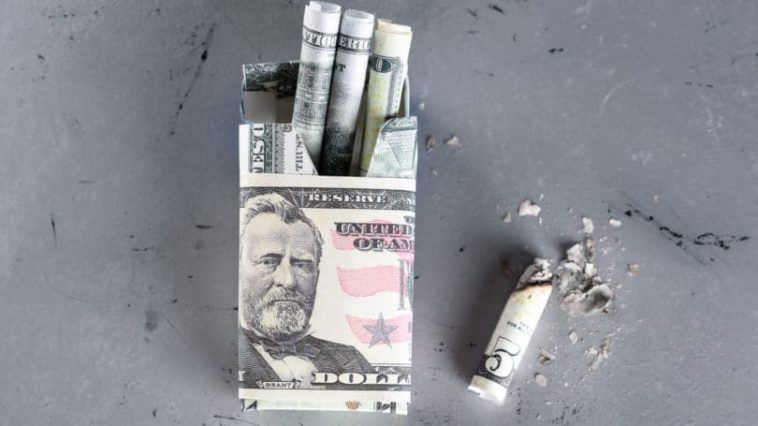The Financial Benefits of Quitting Smoking
Once advertised as the “cool” and “elegant” thing to do, smoking has lost its edge. The number of people in the U.S. who smoke has been falling each year for many years now.
In 2015, nearly 21% of U.S. adults smoked at least a few times a week, according to the CDC. By 2018, the CDC reported only about 13.8% of U.S. adults were current smokers.
Quitting smoking is tough, but it’s worth it. Once you kick the habit, you not only enjoy improved health but also see financial benefits. In some instances, you’ll see the financial gain right away.
If the promise of better health hasn’t gotten you to quit smoking, thinking about the financial benefits could be what gets you to give up tobacco for good.
The Financial Benefits of Quitting Smoking

1. More Money in Your Pocket (or Bank Account)
The price of cigarettes has climbed in recent years. States and cities have increased taxes on tobacco products, and the tobacco companies have also raised prices.
When you buy a pack of cigarettes, you’re paying for the cigarettes themselves, plus a federal cigarette tax of $1.01, plus your state’s cigarette excise tax, plus state sales tax in some cases.
States’ cigarette excise taxes vary considerably. The average tax across all states is $1.91 per pack.
Washington, D.C. has the highest tax rate, charging $4.50 per pack. New York state has the second-highest at $4.35 per pack. Missouri has the lowest cigarette tax at just 17 cents per pack. Because of taxes, the average cost of a pack of cigarettes in D.C. or New York is over $10. In Missouri, you can still get a pack for less than $5.
To get a sense of how much you could save if you quit smoking today, let’s use the average price for a pack of cigarettes across the U.S.: $6.30 (as of June 28, 2019), according to the Campaign for Tobacco-Free Kids.
If you smoke one pack a day, on the first day you quit, you will have an extra $6.30 in your pocket. Put that extra money in a savings account, open a brokerage account and start investing it, or use it to pay down debt.
You’ve made it through the first week smoke-free. Congratulations! If you used to smoke a pack a day, you’ll have an extra $44.10 in your wallet.
After 30 days without smoking, you’ll have successfully saved $189. Make it one full year without a smoke, and you’ll have saved $2,299.50.
Quitting smoking today doesn’t just allow you to save the money you would otherwise spend on cigarettes. You’ll also save the money you would have spent on smoking-related accessories, such as lighters, breath mints, and ashtrays.
2. Reduced Health Care Costs
Every year, nearly half a million people die as a result of cigarette smoking, according to the CDC. You’ve probably heard the laundry list of health issues smoking and tobacco use can cause:
- Lung and other cancers
- Chronic obstructive pulmonary disease
- Heart disease
- Stroke
- Asthma
- Fertility issues
- Gum disease
- Tooth loss
- Cataracts
- Type 2 diabetes
- Rheumatoid arthritis
- Wrinkles and premature signs of aging
Smoking-related illnesses increase your health care costs and put a burden on the health care system as a whole. Smoking-related illnesses cost more than $300 billion per year, with $225 billion going to pay for direct medical expenses, according to the CDC.
Once you quit smoking, health improvements happen quickly. About 20 minutes after your last cigarette, your blood pressure drops and your heart rate slows, according to Tobacco Free Life. If you suffer from cold hands or fingers, you might notice they warm up soon after you quit smoking.
You’ll have a nicotine-free system within 24 hours of quitting. You’ll have cravings at this point, but stay strong! Your risk of heart attack starts dropping between 15 and 90 days after you quit.
Your blood circulation will return to normal between 10 days and two weeks after you stop smoking. If you previously had trouble with your gums and teeth, your smile will look healthier.
According to the American Cancer Society, your risk of developing heart disease is cut in half about one year after you quit smoking. After five years, your stroke risk falls to that of a nonsmoker, as does your risk of bladder, mouth, esophagus, and throat cancer.
Quitting smoking significantly cuts your risk of lung cancer and improves lung function. If you remain smoke-free for a decade, your risk of dying from lung cancer is about half of that of someone who still smokes.
3. Lower Health Insurance Premiums
The Affordable Care Act prevents health insurance companies from denying you coverage for preexisting conditions, but it doesn’t prevent insurance companies from charging you extra if you smoke.
In some cases, the cost of a smoker’s premium can be up to 50% higher than the cost of a nonsmoker’s, according to Health Affairs. Insurance companies justify the higher premium because they usually end up paying more for smokers’ health care than for nonsmokers’.
Your insurance premiums won’t drop the minute you quit smoking. Usually, insurance companies charge premiums to people who used any sort of tobacco product within the past six months.
But you’ll qualify to sign up for a new plan as a nonsmoker during the first open enrollment period after that six months is up.
Along with enjoying lower health insurance premiums as a nonsmoker, you’ll also enjoy lower life insurance premiums after quitting. Since smokers have lower life expectancy than non-tobacco users, life insurance companies often charge them premium rates that are double or triple the rates offered to nonsmokers.
4. Reduced Cleaning Costs
Smoking not only affects your appearance and health. It can also affect the looks of your home or other areas where you smoke.
Cigarette smoke permeates and lingers in soft materials such as carpets and curtains. Tobacco smoke makes furnishings and fixtures smell and will stain or discolor them.
Keeping a home clean when you smoke inside is also expensive. You might have to rent special equipment, such as a carpet cleaner, to get rid of the smoke smell and stains. Depending on how much you smoke indoors, you might need to hire a professional cleaner who specializes in restoring smoke-damaged homes.
Smoking in a rental residence often means you won’t get your full security deposit back when you move – if you get anything. Quitting smoking now won’t magically clean your home, but smoke will stop building up.
After you quit smoking, your laundry cost and dry cleaning bills will probably drop too. When your clothes don’t smell like an ashtray, you don’t have to wash or dry clean them every time you wear them.
5. Quitting Smoking Helps Your Friends & Family
Your decision to quit will also help your friends and family save money, especially if you used to smoke around them.
Secondhand smoke contributes to productivity losses of $5.6 billion per year, according to the American Lung Association. People exposed to secondhand smoke might miss workdays because of illness or be slower on the job if they are surrounded by smoke.
Kids exposed to secondhand smoke are more likely to develop lower respiratory tract infections, middle-ear problems, asthma, or other smoking-related diseases. In 2009, total health care costs related to secondhand smoke in California alone were over $241 million, according to Tobacco Control.
When you quit smoking, you protect and improve the health of the people you care most about. You also help them save money by reducing their risk of developing preventable conditions.
6. Quitting Smoking Helps Your Employer Save Money
When you quit smoking, you also help your employer. According to the CDC, $156 billion of the $300 billion in smoking-related health care costs each year comes from lost productivity – and $5.6 billion of that is related to lost productivity due to secondhand smoke.
As a smoker, you’re likely to miss twice as many days of work due to illness compared to a nonsmoker. You’re also more likely to go to the hospital or seek health care, which means higher medical expenses for you and higher health insurance costs for your employer.
Why should you care about the costs your employer has to pay because of your smoking?
Think of it this way: If you quit smoking and begin missing fewer days and taking fewer breaks, your employer is likely to notice. You’re more likely to get a raise or promotion if your boss sees a boost in your performance.
Final Word
Quitting smoking is one of the best things you can do for your health, both physically and financially.
Although it is challenging to give up cigarettes, especially if you’ve been smoking for years, it can be done. There are many resources out there, from your friends and family to your family doctor, to help you along the way.
Once you give up the habit, you’ll have a new lease on life and way more money in your pocket. Just think about what you could do with an extra $44 per week or an extra $2,200 each year, and that might be all the incentive you need to say goodbye to tobacco.
Published at Tue, 15 Jun 2021 20:30:01 +0000





Comments
Loading…